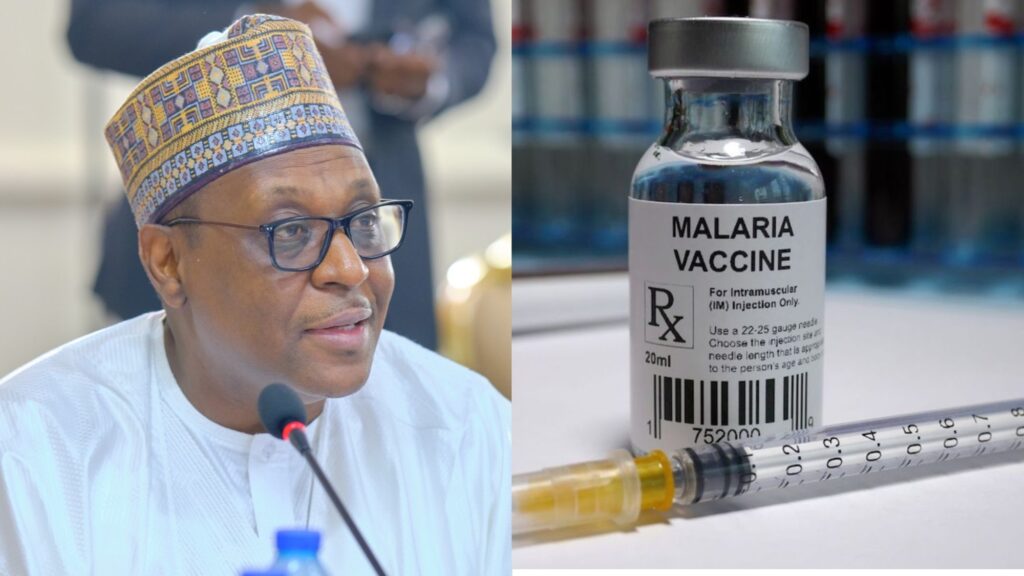By Olaitan Ibrahim
The Nigerian government had scheduled to commence vaccination against malaria in November, aiming for a 13 percent reduction in all-cause mortality among children under five.
On Thursday, the Federal Government received 864,200 doses of the R21/Matrix-M malaria vaccine from Gavi, the Vaccine Alliance. An additional 153,800 doses are expected, to secure one million doses in this initial phase.
Stakeholders have described the arrival of the vaccines which will be offered freely to children as a significant milestone in preventing malaria, which claims hundreds of thousands of lives in Nigeria each year, with children bearing the most burden.
Malaria remains a leading cause of morbidity and mortality in Nigeria, which bears the highest-burden globally. According to the World Health Organization (WHO), Nigeria recorded an estimated 68 million cases and nearly 200,000 malaria-related deaths in 2022.
The WHO’s 2023 malaria report indicated that Nigeria accounted for 27 percent of the global malaria burden, with up to 36% of under-five mortality in the country attributed to malaria.

Muyi Aina, Executive Director/CEO of the National Primary Health Care Development Agency (NPHCDA), speaking at the vaccine launch in Abuja, stated that the vaccine would quicken malaria control and elimination efforts, as the government is also targeting 22 percent reduction in hospitalised severe malaria cases.
The WHO approved two vaccines: RTS,S, known as Mosquirix, and R21/Matrix-M, which has shown a higher efficacy of 77 percent in initial trials.
Aina explained that Nigeria will implement a phased introduction strategy in line with WHO recommendations, prioritising the vaccine in areas with high to moderate transmission.
The first phase, starting in November, will target two states—Kebbi and Bayelsa—both of which have a high prevalence of malaria. Kebbi was chosen due to its highest prevalence rate in the country at 52 percent while Bayelsa was selected because its target population of 69,935 aligns with the available one million doses for this phase, ensuring effective vaccine distribution.
The vaccine will be administered to children aged 5 months to 15 months as part of Routine Immunisation. Each child will require four doses, given at 5, 6, 7, and 15 months of age, to ensure full protection.
Aina further explained that the introduction would expand to other states and be integrated into the national routine immunisation schedule as more doses become available. The second phase will target 19 states and the Federal Capital Territory (FCT), while the third phase will encompass the remaining 15 states, both scheduled for 2025.
To ensure a successful roll-out, the NPHCDA Boss said the agency has established a comprehensive coordination mechanism that brings together key stakeholders and expertise in malaria and immunisation at both national and subnational levels.
“A robust demand generation strategy has been developed that centres on the needs and expectations of stakeholders, including caregivers, community gatekeepers, and frontline health workers”, he explained.
“Let me assure all Nigerians and friends of Nigeria, that these vaccines, and subsequent deliveries will be equitably and effectively utilised to the benefit and wellbeing of our people”, he added.
Muhammad Pate, Coordinating Minister of Health and Social Welfare, who officially launched the vaccines, emphasised their importance in preventing malaria, stating, “Every child that completes the full course of the vaccine has the opportunity to live a healthy life, free from the disease. It’s a miracle, but also a source of opportunity.”
The minister noted that the current supply of vaccines is insufficient for the entire population and urged Nigerians to take advantage of the limited availability while disregarding misinformation from those who may not fully understand the situation.
Walter Mulombo, WHO representative in Nigeria, expressed optimism about the vaccine’s potential to save lives, stating, “We are confident that this vaccine, in combination with other preventive measures, will drastically reduce the burden of malaria in Nigeria and help us move closer to achieving the goal of a malaria-free Africa.”
Gbenga Mokuolu, National Coordinator of the National Malaria Elimination Programme (NMEP), cautioned that the vaccine must be complemented by continued investment in healthcare infrastructure and education.
“The vaccine is not a magic bullet. Sustained efforts, including awareness campaigns and improved healthcare delivery, will be key to ensuring that the benefits of the vaccine reach every corner of the country,” he said.